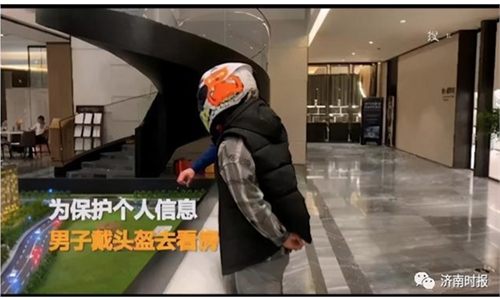
Facial recognition Illustration: AFP
Several Chinese cities, including Tianjin and Nanjing, have issued policies that ban the illegal collection of face information and compulsory facial recognition.
Tianjin Municipality approved a new regulation on its Social Credit Regulations Tuesday, effective from January 1, 2021, stipulating that when the market credit information provider collects a person's information, it must obtain the consent of the person involved.
Moreover, the market credit information provider must not collect information on religious belief, blood type, disease and medical history, biometric information and other personal information prohibited by laws and administrative regulations.
As a result, enterprises, public institutions, trade associations and chambers of commerce are prohibited from collecting face, fingerprint, voice and other biometric information, according to the new regulation.
A draft amendment to Hangzhou's property management regulations, which was submitted for approval in October, stipulates that property service providers should not force property owners to use shared facilities through biometric information such as fingerprints and facial recognition.
Last month, a short video of a man wearing a helmet to visit a real estate agency in Jinan, East China's Shandong Province, went viral on social media. Video captions showed the man was wearing a helmet to protect his personal information. This led to the topic of protecting personal information being widely discussed by netizens.
With the development of the smart community, more and more communities have begun to install facial recognition systems to control access. Some netizens believe facial recognition is convenient for security management, while those who disagree think it is illegal to collect personal information at will, and some are worried about the adverse consequences caused by a leak of personal data.
Nanjing's housing security and property bureau issued an urgent notice in late November, requiring all real estate sales offices to stop recording visitors' facial information without their consent.
Shi Yuhang, a lawyer and Certified Information Security Professional (CISP) told the Global Times that central authorities are now working on protecting citizens' information security better with constantly improving laws and regulations at a national level.
The Cyberspace Administration of China (CAC) is seeking to clarify the scope of information that mobile apps are allowed to collect. It released a set of draft rules on Monday which looks to cover 38 types of apps including map navigation, instant messaging and car hailing. The public have until December 16 to comment on the draft rules.
Shencheng Chuxing, an official taxi-hailing app in Shanghai, said it welcomes the draft rules. "We attach importance to users' privacy, and only collect some necessary information such as phone numbers and locations," Shencheng Chuxing's general manager Yuan Dongliang told the Global Times. The platform collects users' information with their permission and authorization, Yuan added.
"Earlier, the Personal Information Protection Law of China, for which the public comment period just ended on November 19, plans to regulate that collection of personal information through equipment in public areas, such as facial recognition information, can only be processed for public security purposes, and it must prominently notify individuals," Shi told the Global Times.



